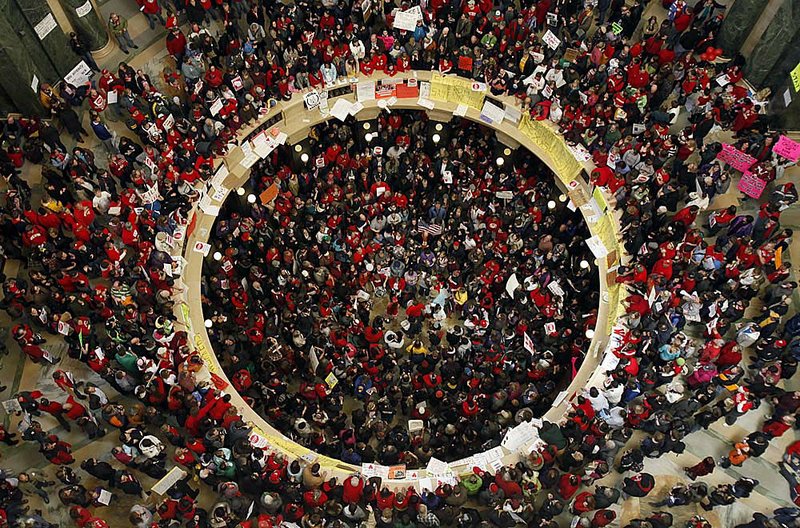MADISON, Wis. — With tens of thousands of protesters jamming the Capitol and many Wisconsin schools closed for a third day, state troopers were enlisted Friday in the hunt for 14 Democratic state senators whose disappearance has prevented a vote on the new governor’s contentious budget proposal.
Republican Gov. Scott Walker’s plan seeks to save the state money by curbing state employee benefits and putting tight restrictions on their collective-bargaining rights. Wisconsin’s deficit is projected at $30 million for the remainder of the current year; a far greater shortfall of $1.5 billion is expected next year, according to state figures.
“We’re here today because we were elected to make tough decisions,” Walker said at a news conference late Friday afternoon. He insisted that what he is asking is “a very modest request of our government workers.”
He acknowledged, however, that he will not be able to do anything until the absent Democrats return. “You can’t operate in a democracy if people don’t show up,” he said.
Senate Majority Leader Scott Fitzgerald, a Republican, said he asked Walker to send two state troopers to Democratic leader Mark Miller’s home. But the senators appear to have decamped to Illinois, putting them out of the troopers’ reach.
One of those missing senators, Robert Jauch, spoke by cell phone from “someplace in the Land of Lincoln.” He said that he and his colleagues understood the need for budget cuts.
“We can vote for the budget in 30 minutes,” Jauch said. “This is all about the rest of the bill, which eliminates 50 years of collective-bargaining law in Wisconsin.”
The state Assembly adjourned until at least Tuesday without voting on the proposal.
Walker’s plan to restrict collective-bargaining rights is a key piece of his budget cutting strategy. With nearly half of the state budget going toward aid to counties, cities and school districts, Walker argues that those localities must be allowed to cut the compensation of their unionized workers. The legislation eliminates the rights of most government workers to negotiate for anything but wages.
Unions could still represent workers, but could not seek pay increases above those pegged to the Consumer Price Index unless approved by a public referendum. Unions also could not force employees to pay dues and would have to hold annual votes to stay organized.
The repercussions, both sides agree, could spread as other states grapple with growing deficits and taxpayer anger and as President Barack Obama and Congress consider how to confront the forces that are driving up federal spending.
Public-employee unions and their Democratic allies accuse Walker of exploiting Wisconsin’s fiscal problems to further a goal of weakening the bargaining leverage and the political clout of organized labor. Union membership in the United States has been on the decline for decades; last year, for the first time, government workers, rather than those in the private sector, accounted for a majority of all union members.
AFL-CIO President Richard Trumka stood steps from the entrance of the state Capitol on Friday and declared that Walker is “standing in the doorway of our country’s most basic values and cherished aspirations. Gov. Walker, you’re asking too much. We won’t give it to you, and you can’t take it away from us.”
Some of the protesters’ signs pictured Walker alongside Adolf Hitler and Egypt’s ousted dictator Hosni Mubarak.
Republicans, meanwhile, say that public-sector employees have become a privileged class that overburdened taxpayers - including many working in the private sector who have seen their own salaries and benefits shrinking - can no longer afford to subsidize.
The Wisconsin standoff quickly became a national debate, drawing in politicians from around the country.
“The big public-employee unions have just run the table. It is outrageous and the gig is up,” said former Minnesota Gov. Tim Pawlenty, who tangled with his state’s employees when he was in office and who is now considering a bid for the GOP presidential nomination.
With Obama’s political operation lending support to the protesters, U.S. House Speaker John Boehner, R-Ohio, accused the president’s team of “colluding with special-interest allies across the country to demagogue reform-minded governors who are making the tough choices that the president is avoiding.”
In Richmond, Virginia Gov.Robert McDonnell, a Republican, released a video of solidarity with Walker. “I know it’s tough to tell hardworking state employees they’ve got to do more with less,” McDonnell said. “I’ve done it in Virginia, and Scott Walker has had the fortitude early in his term to tell that to the people of Wisconsin.”
Meanwhile, smaller protests also are stirring in Ohio, where another new Republican governor, John Kasich, has proposed limiting collective-bargaining rights for state employees. “I don’t favor the right to strike of any public employee, OK?” Kasich said in December. “They’ve got good jobs, high pay, good benefits, a great retirement. What are they striking for?” Information for this article was contributed by Peter Whoriskey and Rosalind S. Helderman of The Washington Post and by Scott Bauer, Todd Richmond, Dinesh Ramde, Jason Smathers, Michael Tarm, Jim Vertuno, Scott Bauer and Michael Gormley of The Associated Press.
Front Section, Pages 1 on 02/19/2011

